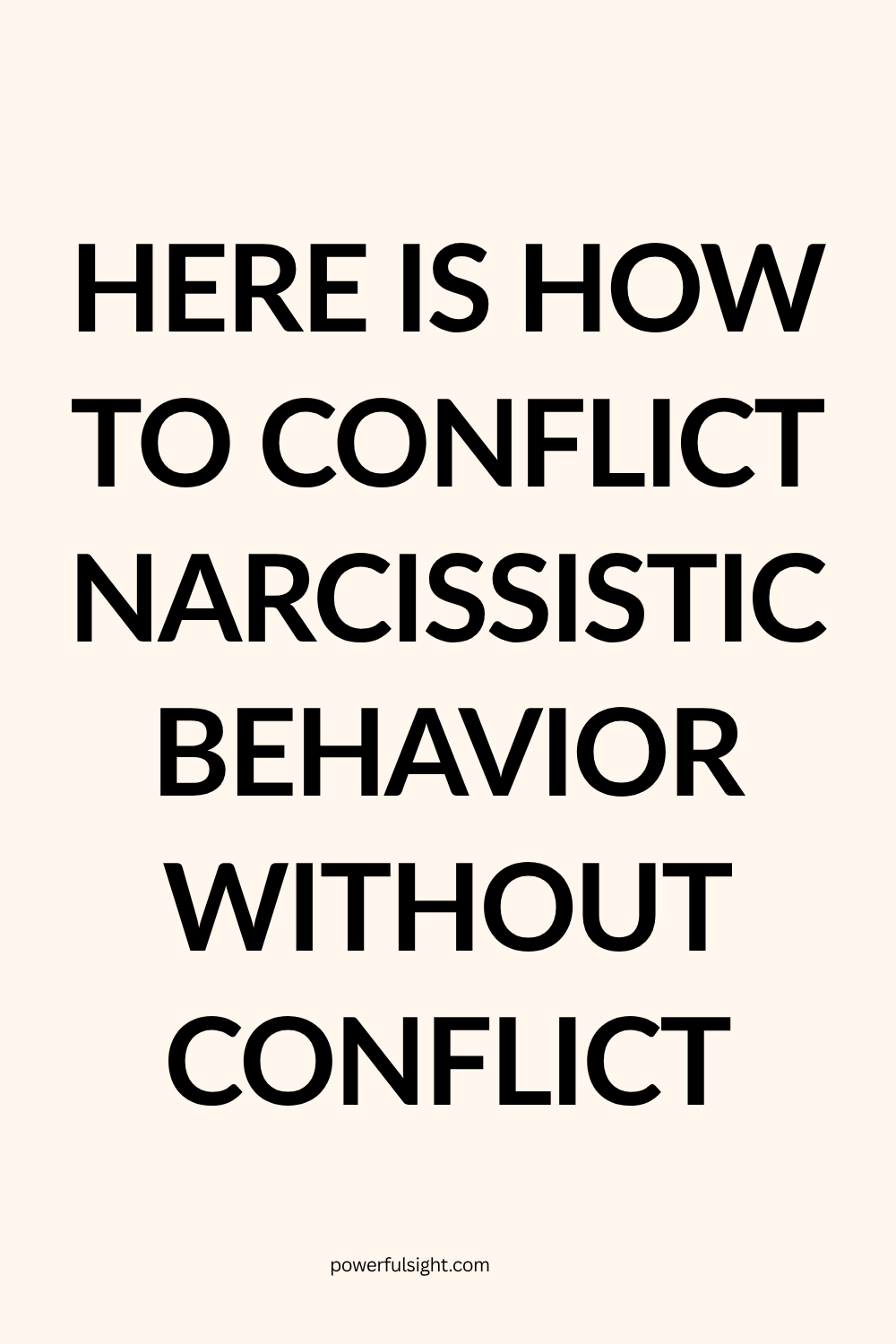Dealing with narcissistic behavior is not easy at all. Whether it’s a family member, coworker, friend, or partner, narcissism can strain any relationship.
However, you don’t have to argue, fight, or cause a scene with a narcissistic person. With some self-control and emotional intelligence, you can learn how to deal with narcissistic behavior and still get along.
In this post, we’ll talk about how to interact with narcissistic people without creating conflict. You’ll learn how to deal with narcissistic behavior, what to do when they talk over you, and how to maintain your peace of mind while staying connected with them.

What is Narcissistic Behavior?
You can spot narcissistic behavior by a set of traits that include self-centeredness, a lack of empathy, and an inflated sense of importance. Some of the common narcissistic behaviors include:
-
Demanding constant attention or admiration from others
-
Disregard or lack of concern for other people’s feelings or needs
-
Overstating or exaggerating their achievements, talents, or abilities
-
Manipulating or controlling situations or people to get what they want
-
Inability or refusal to accept criticism, feedback, or defeat
These narcissistic behaviors can make life with a narcissist challenging and frustrating. However, remember that narcissism is on a spectrum.
You can have narcissistic traits and not have the full-blown narcissistic personality disorder. Therefore, it’s possible to deal with narcissistic behavior in a different way if you are aware that this person does not have a diagnosis.
Related: 13 Signs of Covert Narcissism in Everyday Relationships
Understanding Narcissistic Behavior: Why Do They Act This Way?
Before we learn how to deal with narcissistic behavior, it’s essential to understand the root cause of such behavior. In most cases, narcissistic people have a lot of insecurities, and their behavior is a cover-up for those insecurities.
Narcissism can be the result of the following:
-
Childhood experiences: In some people, narcissistic traits can be a defense mechanism from childhood neglect, abuse, or overindulgence.
-
Insecurity: Narcissists can be highly insecure deep down, which is why they are constantly seeking external validation.
-
Learned behavior: In some cases, narcissistic behavior can be learned through modeling others or by cultural influences that praise individualism and success.
Understanding where narcissistic behavior comes from will not make you forgive it, but it will provide you with the necessary context for why this person acts the way they do. When you know where their behavior stems from, you will be able to respond with a higher level of control.
Related: 11 Types Of Narcissism You Don’t Know Exist
How to Conflict Narcissistic Behavior Without Conflict
1. Set Boundaries Without Being Confrontational
Setting boundaries is one of the most effective ways to deal with narcissistic behavior. Narcissists tend to overstep boundaries, whether it’s controlling the conversation, space, time, or demanding too much attention. To avoid conflict, you need to set those boundaries in advance and assertively, without being confrontational.
Here are a few tips on how to set your boundaries without being confrontational:
-
Be direct and clear: Narcissists are masters of manipulation, so you need to be crystal clear on what’s acceptable and what’s not. For example, if you have a narcissistic coworker who interrupts you all the time, you can simply say, “I would appreciate it if you let me finish what I’m saying before replying.”
-
Stay calm: Narcissists are drama queens and kings, and they need an emotional response to feel fulfilled. If you remain calm and don’t engage with their attempts at drama, you are less likely to cause conflict. Practice emotional detachment when dealing with a narcissistic person and don’t get pulled into their need for validation and attention.
-
Stick to your boundaries: If you set a boundary, don’t budge. Narcissistic people will try to see if you’re serious about the boundary by testing you, so if you are consistent with your response, they’ll eventually get the message that you won’t tolerate such behavior.
Related: How To Set Boundaries With A Narcissist
2. Use Active Listening Without Losing Yourself
Active listening is another excellent tool you can use to deal with narcissistic people without creating conflict. Narcissists are constantly in need of external validation, so providing them with the space to talk and be heard can reduce the intensity of the conflict.
Active listening is a way of responding to narcissistic behavior without getting dragged into the conflict, so it’s always a great choice when dealing with a narcissist. However, active listening does not equal agreeing with everything the other person says. It simply means that you acknowledge their point of view but don’t let yourself get taken hostage by their self-centeredness.
To actively listen to a narcissist, try the following:
-
Give them the floor: Let the narcissistic person talk without interrupting. You don’t have to agree with everything that they’re saying, but making them feel that you understand can help reduce the need to interrupt you and dominate the conversation.
-
Paraphrase what they’re saying: After a narcissist has said their piece, you can paraphrase what they were saying. For example, “I hear that you’re upset about the way the project was handled, and I can see why that would be frustrating.” This way, you are letting them know that you’re listening without falling into their emotional trap.
-
Redirect the conversation: If the narcissistic person starts to talk in circles or go off-topic by starting to self-aggrandize, you can redirect the conversation back to the main point without causing conflict. For example, “I understand your point, but I think we should focus on finding a solution now.”
Related: 9 Signs You Don’t Love Yourself Enough
3. Keep Your Expectations Realistic
Keeping your expectations realistic is another great way to deal with narcissistic people without creating conflict. Narcissists are highly unlikely to change their behavior, and it’s important not to have high or unrealistic expectations of them. Remember that they may never truly understand you, and they may never give you as much empathy or validation as you’re willing to provide for them.
To have realistic expectations:
-
Don’t expect emotional reciprocity: It’s very unlikely that you will ever see the same level of care or concern for your emotions in a narcissist that you have for theirs. It’s important to accept this dynamic and keep your expectations in line with it.
-
Be ready for manipulation: Narcissists are highly manipulative and will always try to play games with you or guilt-trip you into submission. Don’t get frustrated; simply acknowledge their behavior, set the boundary, and move on.
-
Don’t take it personally: Narcissists have a completely skewed version of reality, and their behavior has very little to do with you and everything to do with their own emotional issues. When they’re acting like a complete narcissist, it’s not about you or a reflection of your worth, but a manifestation of their internal struggles.
Related: Healing After a Narcissistic Relationship Boundaries
4. Avoid Power Struggles and Control Games
Power struggles and control games are another common dynamic that you may encounter when dealing with a narcissist. Narcissists can be highly controlling, and they love to exert dominance over other people. If you try to fight back or resist their power, the situation can easily turn into a conflict. To avoid such scenarios, you need to stay in control of yourself and your emotions rather than trying to control the narcissist.
Here’s how you can avoid power struggles and control games when dealing with narcissistic behavior:
-
Don’t get into a battle of wills: Narcissists are like bloodhounds when it comes to being right. If you sense that the conversation with a narcissist is turning into a power struggle, simply disengage. You can say, “I don’t think we’ll agree on this, so let’s just agree to disagree.”
-
Use humor: Humor is a great tool to avoid power struggles and control games with narcissists. If you feel that the narcissistic person is about to start one, a well-placed joke can make them think twice or at least help you break the tension without starting a conflict.
-
Practice emotional detachment: Remember that you cannot control a narcissist’s behavior, and you shouldn’t take it personally. Detach from their actions and words and focus on your own emotional well-being instead.
Related: 15 Signs A Narcissist Is Losing Control Over You
5. Choose Your Battles Wisely
Picking your battles is an important part of dealing with narcissistic people without creating conflict. You can’t argue or set a boundary on everything, and some comments or behaviors are better left ignored. It’s not uncommon for narcissists to try to push your buttons, but by walking away from the minor issues, you can still get along.
To choose your battles wisely:
-
Ask yourself if this is worth engaging in: Not everything needs to be addressed. Can you let the situation pass, or is this something that will affect your life in the long term? Is this person lying, manipulating, or overstepping boundaries? If these are the case, then yes, this is worth engaging in. If not, it’s better to move on.
-
Ask yourself if my response is aligned with my goals: Before you react to the narcissistic person’s comment, ask yourself if you want to keep the peace or get them to see your side. If your goal is to maintain your peace, then responding in a calm and neutral way will help you achieve your goal.
Related: 7 Sneaky Things Narcissists Say
6. Take Care of Yourself
The last and most important step in how to deal with narcissistic people without creating conflict is to take care of yourself. Narcissists can be highly emotionally and mentally draining, and constantly trying to manage or control their behavior can take a toll on your health. Therefore, it’s important to practice self-care and ensure that you’re taking care of your well-being when in a relationship with a narcissist.
To maintain your peace of mind:
-
Practice self-care: Make sure that you practice self-care, especially if you’re constantly interacting with a narcissist. Whether it’s working out, meditating, engaging in a hobby, or spending time with your loved ones, find what works for you and do it as often as possible to avoid burnout.
-
Seek professional help if necessary: If you find it difficult to deal with narcissistic behavior on your own, you can always seek professional help. A therapist can help you work through your issues with narcissism and provide you with tips on how to protect your mental health in such relationships.
Conclusion
Dealing with narcissistic behavior doesn’t have to involve arguments, fights, and unnecessary conflict. If you set boundaries, practice active listening, manage your expectations, and avoid power struggles, you will be able to maintain your peace of mind while still being around narcissistic people.
The most important thing to remember is that you cannot change someone’s behavior, but you can change how you respond to it. By staying calm, setting healthy boundaries, and keeping your emotions in check, you will be able to minimize the risk of conflict and maintain your well-being in the process.
Save pin for later.

- How To Make New Habits Stick - 02/01/2026
- How to Become More Decisive - 01/01/2026
- 9 Small Things To Do To Better Your Life In 2026 - 31/12/2025
